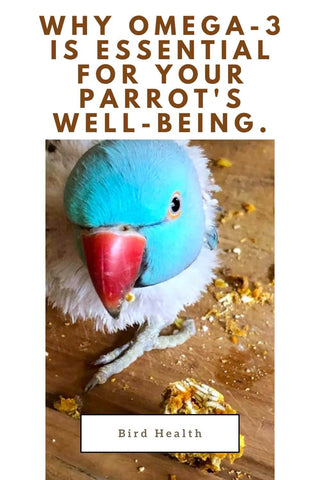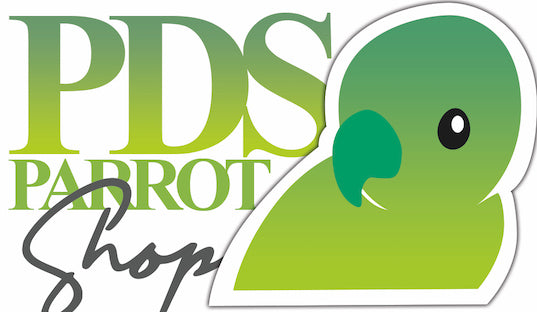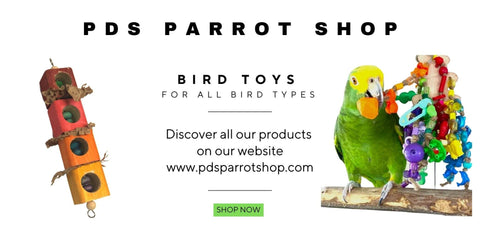
Why Omega-3 is Essential for Your Parrot's Well-being.
Share
What is Omega-3?
Omega-3 fatty acids are essential nutrients crucial for various bodily functions, including brain health, heart function, and inflammation reduction. While commonly associated with fish oils, Omega-3 can also be found in plant sources like flaxseed and chia seeds.
Importance of Omega-3 for Parrots
Just like humans, parrots benefit significantly from Omega-3 in their diet. These fatty acids play a vital role in maintaining their overall health, from cognitive function to immune system support.

Natural Sources of Omega-3 for Parrots
In the wild, parrots acquire Omega-3 through their natural diet, which includes seeds, nuts, fruits, and insects. Therefore, I is essential for our pet parrots to have access to the same variety of foods.
Benefits of Omega-3 for Parrots
Omega-3 fatty acids are important for several reasons due to their impact on various aspects of health:
-
Heart Health: Omega-3s, especially EPA and DHA found in fatty fish, have been shown to lower blood triglyceride levels, reduce blood pressure, and prevent the formation of blood clots. These factors contribute to a lower risk of heart disease and stroke.
-
Brain Function: DHA, a type of omega-3 fatty acid, is a crucial component of the brain and plays a key role in its development and function. Adequate intake of omega-3s has been associated with better cognitive function and a reduced risk of neurodegenerative diseases.
-
Eye Health: DHA is also a major component of the retina in the eyes. Consuming omega-3 fatty acids, particularly DHA, has been linked to a lower risk of age-related macular degeneration (AMD) and other eye conditions.
-
Inflammation: Omega-3s have anti-inflammatory properties, helping to reduce inflammation in the body. Chronic inflammation is associated with various diseases, including heart disease, arthritis, and certain cancers. Omega-3s may help mitigate inflammation and contribute to overall health.
-
Mood and Mental Health: Some studies suggest that omega-3s, particularly EPA, may have a positive impact on mental health by reducing symptoms of depression and anxiety. They are thought to influence neurotransmitter function and support overall emotional well-being.
-
Autoimmune Conditions: Omega-3s may have a role in managing autoimmune diseases by modulating the immune response and reducing inflammation.
-
Feather Health: A diet rich in Omega-3 promotes healthy feather growth and enhances the vibrancy of a parrot's plumage. It reduces the risk of feather plucking and ensures that the feathers remain strong and lustrous.
How to incorporate omega-3 into our birds diet?
Omega-3 fatty acids can be beneficial for the health of parrots, just as they are for humans and many other animals. These essential fatty acids play a crucial role in maintaining the overall well-being of birds, including their cardiovascular health, brain function, and immune system.
Incorporating omega-3 fatty acids into a parrot's diet can be achieved through various food sources. Here are some options:
Fish: Certain types of fish are rich in omega-3 fatty acids, particularly oily fish like salmon, mackerel, and sardines. However, it's essential to ensure that the fish is safe and suitable for your parrot, as some species may contain high levels of mercury or other contaminants. You can offer small amounts of cooked fish to your parrot as an occasional treat. ( At PDS we don't use any animal products for our birds, but use the following listed below for omega-3)
Flaxseeds: Flaxseeds are an excellent plant-based source of omega-3 fatty acids. You can sprinkle ground flaxseeds over your parrot's food or mix them into homemade bird treats.
Chia Seeds: Chia seeds are another plant-based option rich in omega-3 fatty acids. Like flaxseeds, you can sprinkle them over your parrot's food or incorporate them into homemade treats.
Walnuts: Walnuts are a tasty nut rich in omega-3 fatty acids. You can offer small pieces of unsalted, shelled walnuts to your parrot as a snack.
Hemp seeds: Hemp seeds are exceptionally rich in ALA, which is a type of omega-3 fatty acid. ALA is a precursor to EPA and DHA, the more potent forms of omega-3s found in fatty fish. While hemp seeds predominantly contain ALA, they still offer a valuable source of this essential nutrient.
Edamame: Edamame still contain a notable amount of ALA, the plant-based form of omega-3s. Including edamame in your diet can contribute to your overall omega-3 intake.
Chickpeas: The omega-3 fatty acids in chickpeas may help lower levels of LDL (bad) cholesterol and reduce the risk of heart disease. Consuming chickpeas regularly as part of a balanced diet can contribute to improved cardiovascular health.
How to Make your own Omega -3 Blend for Birds?
Creating your own blend of Omega-3 for birds is a great way to ensure they receive essential fatty acids that support their overall health. Omega-3 fatty acids are crucial for maintaining heart health, reducing inflammation, and promoting healthy skin and feathers in birds.
For Liquid Blend:
Flax Seed Oil
Walnut Oil
Hemp Seed Oil
Pumpkin Seed Oil
Chia Seed Oil
*Buy cold pressed, unrefined, no added preservatives or dyes.
Combine equal parts of oils to create your Omega-3 blend. If desired, you may also enhance the blend by adding vitamin E or beta carotene for additional health benefits. Once mixed, avoid shaking the blend to maintain the integrity of the oils.
Dosage rate 0.22-0.44 cc/Kg orally (or with food) a few times a week.
When introducing new foods or supplements to your parrot's diet, it's essential to do so gradually and monitor for any adverse reactions. Additionally, consult with an avian veterinarian or avian nutritionist to ensure that your parrot's dietary needs are being met appropriately.
Overall, incorporating omega-3 fatty acids into your parrot's diet can contribute to their overall health and well-being, supporting their heart, brain, and immune system function.
For a special blend of Milk thistle, flax seeds, hempseeds and chia, check out our Health Smart Mix for Parrots
Boost Your Bird’s Health: Omega-3 Recipes from Our Cookbook
Omega-3 fatty acids are essential for parrots, supporting feather health, brain function, and overall wellness, and this recipe highlights safe, food-based sources. The Science of Avian Nutrients goes further by explaining which seeds, nuts, and oils provide bioavailable omega-3s, how to balance them with other fats, and why moderation is key. With practical recipes and science-backed guidance, the book helps caregivers boost their bird’s nutrition without relying on supplements alone.
Citation:
Das UN. (2006). “Essential fatty acids: biochemistry, physiology, and pathology.” Biotechnol J. 1:420–439.
Petzinger C, Heatley JJ, Cornejo J, et al. (2010). “Dietary modification of omega-3 fatty acids for birds with atherosclerosis.” J Am Vet Med Assoc. 236 (5):523-527.
Monika Sangar, MSc – Molecular Biology | Avian Nutrition Specialist | Founder: PDSnonprofit | Owner: Pds Parrot Shop
Monika Sangar is a parrot rescuer, bird food chef, and toy designer with over a decade of experience in avian care and nutrition. She is the founder of Prego Dalliance Sanctuary and the author of The Science of Avian Nutrition, a cookbook dedicated to fresh, healthy meals for parrots. Explore more bird care tips and bird toys at PDS Parrot Shop!


3 comments
Great info. Thanks
Monica, I especially appreciated your article explaining the need of Omega-3 in a parrot’s diet and human’s diet. I have aged parrots so I’m always interested in ways to keep them healthy and the special needs of aged birds. Having age related diseases myself, I’m 80, I can really empathize with the health risks and needs to reduce the risks where possible. Thank you for taking time to write this article.
Nelly gets flax and chia in her bird muffins